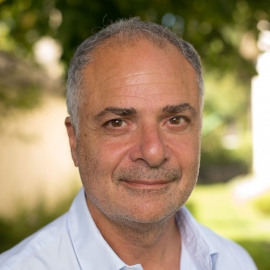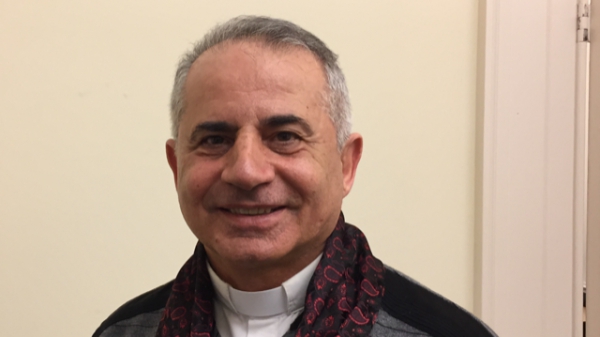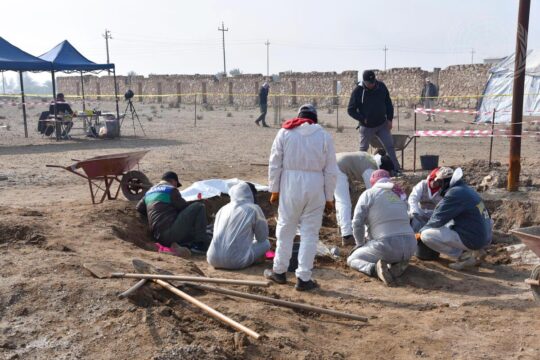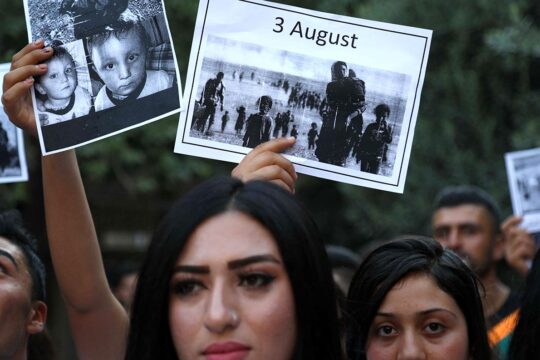What is the point of saving culture if you can’t save people? That seems a derisory question in the spiral of violence hitting Iraq and Syria for years. But not for Father Najeeb. He has managed to save thousands of precious manuscripts that Daesh wanted to destroy because, he says, “Man is like a tree and cannot live without his roots”.
With his soft-spoke manner and obvious kindness, Father Najeeb does not look like a cowboy or an Indiana Jones come to save treasure. This, however, is what this former oil industry engineer born in Mosul has done. For a long time now, he has not been seeking black gold beneath the soil of Iraq but other resources also born there long ago: cross-cultural manuscripts that recount the stories of different communities, including Christians of course, but also Yezidis and Muslims. This Chaldean Catholic has saved 8,000 manuscripts from destruction, some dating back to the 13th century, and some 40,000 documents, including the first books written in Iraq. Along with other refugees like him now in Erbil, Iraqi Kurdistan, he continues working despite the cost to save the past of what was once one of the most culturally fertile parts of the world.
Father Najeeb was in Switzerland in mid-January at the invitation of the City of Geneva. Along with other experts, he is preparing a Declaration aimed at better respecting, protecting and restoring threatened cultural heritage. This is his life’s work. When Father Najeeb talks about the “treasures” he has saved from Daesh, his eyes light up. This man has chosen his weapons against the extremists of Islamic State. He wants to protect culture because, he says, why save Christians of the East persecuted by Daesh, Yezidi victims of genocide or Muslims, if the things that constitute their heritage and identity have been destroyed by the extremists? In the Middle East today, protection of cultural heritage is more than ever part of the fight against all forms of totalitarianism, whether political or religious. Father Najeeb knows that all too well. He has himself been threatened with death and has been seeing for years the exodus of oriental Christians fleeing danger. Preserving the past of his people is also maintaining an identity and a presence. The soldiers of Daesh are well aware of this, hence their will to destroy cultural heritage in order to chase out people they view as infidels. “When the men of Daesh see images of Christ, they target the eyes and the heart, as if he were a living man,” says Father Najeeb with a sad smile.
Cultural treasure
Father Najeeb’s conservation work started at the end of 1980s when Daesh was not yet born. He became aware of the cultural treasure both in the monasteries and people’s homes. Those often poor people did not realize the worth of the heritage they owned. “I remember a man who was ready to sell 13th, 14th and 15th century manuscripts for a bottle of arak!” he says. “Another time a woman told me she was burning old manuscripts to make bread, but her bread was delicious…”
At that time, the totalitarian regime of Saddam Hussein was the real threat. If he had learned that those manuscripts had monetary value, who knows what would have happened. Father Najeeb, who had remained in the shadows for 25 years, photocopied the manuscripts hidden in monasteries and then, with advancing technology and support from the Benedictines of Minnesota, digitalized them.
The situation became tense with the rise of Daesh. Even some of Father Najeeb’s neighbours fell prey to extremist ideology. The battle front got closer. He fled the first time with his manuscripts in 2007 from Mosul to Karakosh on the Nineveh plain. Then in 2014, the situation got worse again. Christians recount that Daesh gave them 24 hours to “convert, die or go”. At checkpoints, men and women were stripped of their wedding rings and jewellery. Father Najeeb fled once again, this time at the last moment. He left Karakosh just as Daesh fighters were arriving. The last manuscripts were stuffed hurriedly into cases as Father Najeeb and his companions fled by car, sitting on their treasures. They ended their flight on foot, running towards a Kurdish checkpoint and handing the manuscripts to children so that they could also run and take them to a safe place.
Reconciliation
Father Najeeb’s rule is to never trade culture. “I do not buy or sell any manuscript,” he says. “The Lord will provide for the salaries of my team that is digitalizing them.” Now he plans to start a museum to tell the tale of this dark period, putting there the archives of Daesh and its black flag which he recuperated. He has just been back briefly to Mosul to deliver training, including to former Daesh supporters, teaching them how to clean and digitalize the manuscripts. “I have been told I am crazy to help those people who burned our churches, looted our goods and killed our loved ones,” he says. “But they were victims of ignorance and a selective, literal understanding of the Koran. We cannot break ties with them, because we have to live together. We need to rise above religion to find our common humanity. Religion is not a passport to Heaven.”






